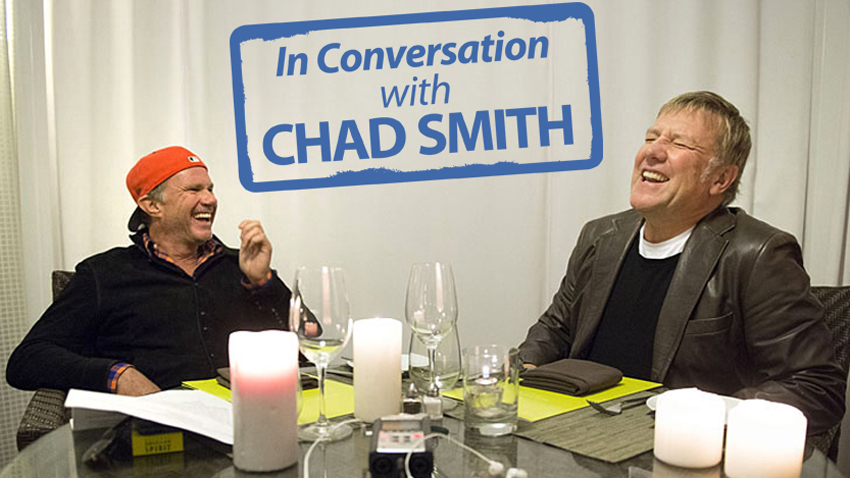
Over the past few weeks, MusicRadar's new podcast series, In Conversation with Chad Smith, has given music fans a virtual place at the dinner table for a lively, intimate and often laughter-filled two-and-a-half-hour chat between the famed Red Hot Chili Peppers drummer and legendary Rush guitarist Alex Lifeson.
Today, the epic sitdown comes to a close. As the gentlemen enjoy after-meal smokes (we're poolside at the Sunset Marquis), they wind things up discussing kids and grandkids, the mechanics of golf vs. music, Rush's then-upcoming jam at the Rock And Roll Hall Of Fame, and working with producers Nick Raskulinecz and Rick Rubin.
After dinner, Smith was ebullient about his maiden foray into the world of podcasting, and he was especially pleased to have chosen the voluble Lifeson as his first guest. "I've been a Rush fan since high school," said Smith. "Neil [Peart] gets a lot of attention, as he should, but Al is underappreciated, I think. He is as great a musician as he is to be around. I'm honored for him to be my first. He was gentle with me."
You can listen to Part Four of In Conversation: Chad Smith with Alex Lifeson below. And to catch up on the first three installments, click here.
In Conversation: Chad Smith with Alex Lifeson - Part Four begins below:
Edited transcript:
Lifeson: I know for me, I know that those kids are not going to be kids much longer. The depth of our connection and our relationship, especially with Taylor, the oldest one… The first three years they lived with us in our house. They bought a townhouse that wasn't built; they were both working. We raised Taylor. He feels so close to us.
Want all the hottest music and gear news, reviews, deals, features and more, direct to your inbox? Sign up here.
Smith: So connected, I bet.
Lifeson: He's a great kid, and very sweet - got a great heart. All that time I spent with him, learning about dinosaurs and flowers and all of that stuff, has connected. We share a certain bond. I'd like to think that he doesn't want to lose that, but I don't want to lose that. I will do anything to maintain that. I love what I do. I love the work that I do. Music is so important to me. [Re: Smith's cigarettes] Oh, you have those?
Smith: You want one? [Offers cigarette.]
Lifeson: Yeah! I have to say that probably for me, the best thing in my life is those two kids.
Smith: That doesn't surprise me, Alex.
Lifeson: It just gives me such a sense of completeness. I never, ever don't want to see them. I'm never too tired. I'm never too whatever to not see them. Even though I know they're going to come over, they're going to kick the shit out of each other with their karate and all that stuff, and not want to go to bed until 11 o'clock, I still cherish it and so enjoy it.
Smith: They're going to grow up quick.
Lifeson: And they're not going to want to hang out with you. It's normal.
Smith: Fuck, no. In, like, three or four years, it's normal. He's going to be 13, he's going to be like, "Give me some money, and I'll see you later."
Lifeson: Yeah, and I'll give him the money, and I'll see him later. [They laugh.]
Smith: My brother's two years older than me. He has kids that are older. He's like, "Chad, you're just an ATM and a taxi service. That's all it is." As soon as they're 15, 16, they don't want to hang out with you. You're not cool. "Can I have some money?"
Lifeson: You were there. You know what it's like.
Smith: Totally. I go, "Brad, that's normal." He said, "I know, but man, you know..." Do what you can. It's hard. Those years, they fly. Cole just turned eight. I can't believe he's eight years old. He's talking about presidents and stuff. It's amazing. Yeah, you're right. I have to get out of my self-centered... Chad's world. Sometimes I can really put my Chad world thing on, like, "I want to do this." I've got to work on that.
Lifeson: That's balance. Everything is balance. There could be worse things to balance.
Smith: That's true.
Lifeson: Like waking up. [They laugh.]
Smith: How do the other gents feel about this whole Hall Of Fame thing? Everybody cool?
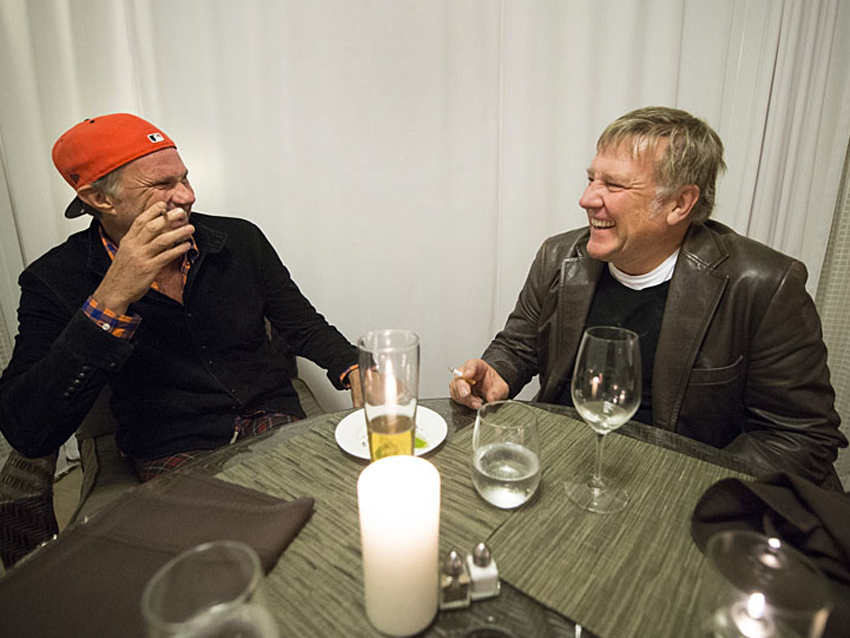
JeromeBrunet.com
Lifeson: Everybody feels pretty much the same way, yeah. In a way, it'll be a relief to be over it, and then we can sort of …
Smith: Go back. You know what was hard for us, was that we were in the middle of a tour. It was all of a sudden… "look back." This whole look back thing... we're always about going "this way," as I'm sure you are. It's jolting. We literally played Cleveland, the blah blah blah arena, two nights before. Then there was this whole back, back stuff, and people coming out of the woodwork from way back in the day.
Lifeson: Memory is a tenuous thing as you get older, too. [They laugh.]
Smith: Right. Right, it was all that. That was odd, and I was glad when it was over. I was like, "Let's go back to what we're doing."
Lifeson: I think there's been such a controversy with us, with the Hall Of Fame. It'll be nice for them as well as us to put it behind us.
Smith: Yeah, put that behind you. But enjoy it though, if you can.
Lifeson: Yeah, we will.
Smith: It's kind of cool. I think you'll like it. It was in Cleveland last year, which was kind of cool. There were a lot of fans that made it better. Performing-wise, it was six hours. Industry people... you've been to those things. They sit at the table, and it's like a long wedding or something. The fans kept it going.
The next night, we went to the Hall, and they gave us a little tour after it closed. We went up to the thing - it's cool. Have you been there before?
Lifeson: I haven't, no.
Smith: You should go. It's pretty cool. It gives you a real sense... this is pretty historic, and there's only 700 and so-odd many people in there. You go up on the top, the third floor. They have the hall where everybody's names are engraved there. It's kind of dark; there should be music on. You walk down the hall, and I'm looking at all these names… "Wow…" Hooker and all these people.
Lifeson: You're history.
Smith: We're going to be right next to each other. You get down to the Rs, and it was my name right below Keith Richards of the Rolling Stones, and the Ramones. I was like, "Get the fuck out! This is not happening!" It was ridiculous… When you see it.
Lifeson: You feel the impact.
Smith: Yes, you do. You feel the impact a little bit. You'll be in the Rs. It was like, "Wow, really, me? Little guy from Detroit, just banging away in my basement, a little kid just wanting to have fun?"
Lifeson: For sure. It's like the guitar thing I was talking about with Gibson.
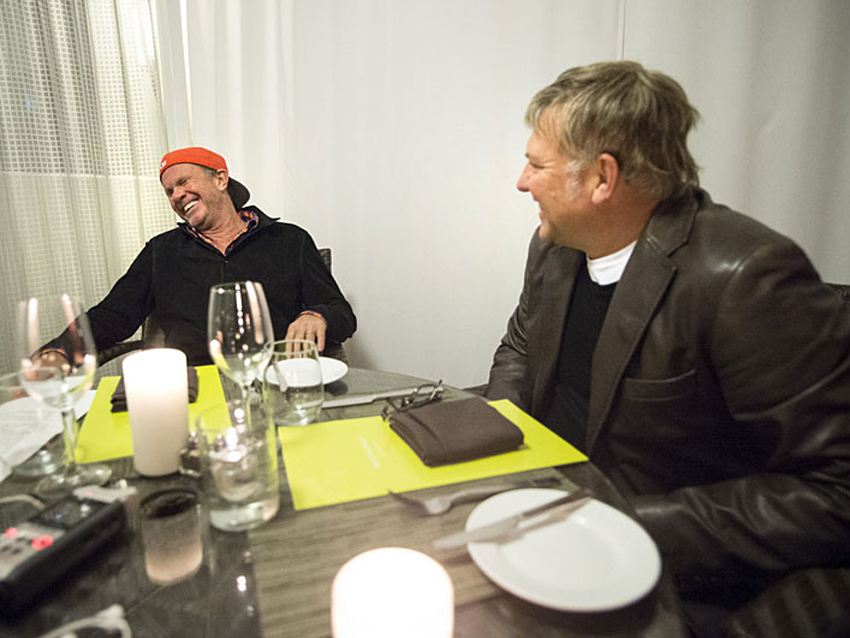
JeromeBrunet.com
Smith: Did you ever imagine, in your wildest dreams, when you were going to that store playing an hour every day on a Gibson…
Lifeson: There would be a guitar with my name on it. Never. Never. This is the instrument that launched so many careers and passions, and to be a part of it; just like this is, whether it's Jann's thing or somebody else's, it's still a pretty cool thing.
Smith: It is a cool thing. I think it's a cool thing. There's controversy, and there always will be.
Lifeson: There should be.
Smith: Right - it's rock 'n' roll. It's supposed to be controversial and dangerous and wrong.
Lifeson: The seed of rock 'n' roll is rebellion. You should fight against the norm, and the establishment, even if it is a museum. [They laugh.]
Smith: I agree with you. At some point maybe... I doubt they will... it shouldn't be the Rock And Roll Hall Of Fame. It should be the "music hall of fame" or something.
Lifeson: Pop music, whatever it is. Broader.
[Photographer Jerome Brunet asks the two to sit closer together.]
Smith: No, that's impossible. I can't sit next to Alex. I have a restraining order. With our cigarette cases.
Lifeson: Kids… [They laugh.]
Smith: Yeah, don't do this insidious …
Lifeson: Don't try this at home.
Smith: Don't do this at home, kids. I saw today, where I know Geddy is a real baseball fan. Does he collect cards?
Lifeson: Memorabilia, yeah.
Smith: I saw this Honus Wagner 1909 - it was supposed to be the Holy Grail card - gone for like two million dollars, the most expensive card. The last auctioneer trimmed the edges to make it look more mint…
Lifeson: Ohhh.
Smith: And sold it for 2.8 million. He actually came clean with it.
Lifeson: Wow.
Smith: He's going to jail for doctoring a baseball card. [They laugh.] I was like, "Shit. Oopsie."
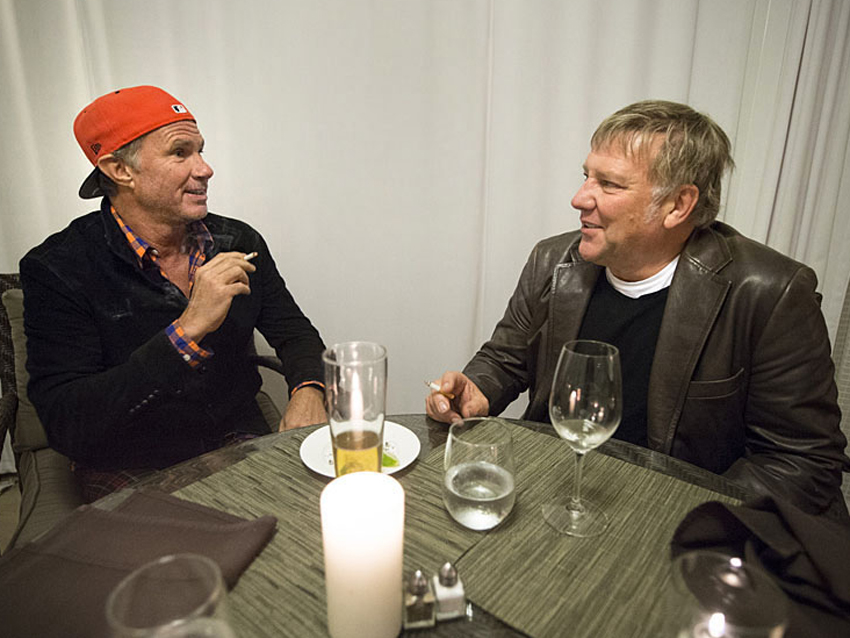
JeromeBrunet.com
Lifeson: Yeah, Ged would be a great owner of a ball team. He knows the stats of guys who are coming up in A-ball, and who's going to be there in four or five years.
Smith: Did he enjoy the film Moneyball at all?
Lifeson: I don't know.
Smith: The general manager… the Brad Pitt movie.
Lifeson: The Brad Pitt movie, right. He plays it.
Smith: Is he on a team, like, in a league?
Lifeson: Yes.
Smith: Hardball?
Lifeson: He's been in there. It's all based on the teams. You trade players. He's been doing it for 10 or 12 years. He's won it, I think, eight or nine years.
Smith: What does he play? What's his position?
Lifeson: No, it's not that he plays.
Smith: Like a fantasy team.
Lifeson: Exactly, right. Last year, he was in third or fourth place in his little league. In the last two weeks of the season, he raced up to first and won, much to the disgust of all the others [laughs].
Smith: He was pretty happy about that?
Lifeson: Yeah. He takes it very seriously. His collection is world-class. In fact, he had a huge Negro League collection that he donated to the Negro Museum. I think that's in Kansas City; I think that's where the museum is. That was a very big deal. He had a very extensive collection in there. He loves baseball.
Smith: That's his main thing?
Lifeson: Yeah.
Smith: What's your handicap these days? You scratching?
Lifeson: No. Currently, I'm about 13. I was down to a 10, went back up to 17, and I've been whittling away at it. That's the thing about golf.
Smith: You've got to play.
Lifeson: Yeah, you do. The game itself is so hard, to be consistently good at it.
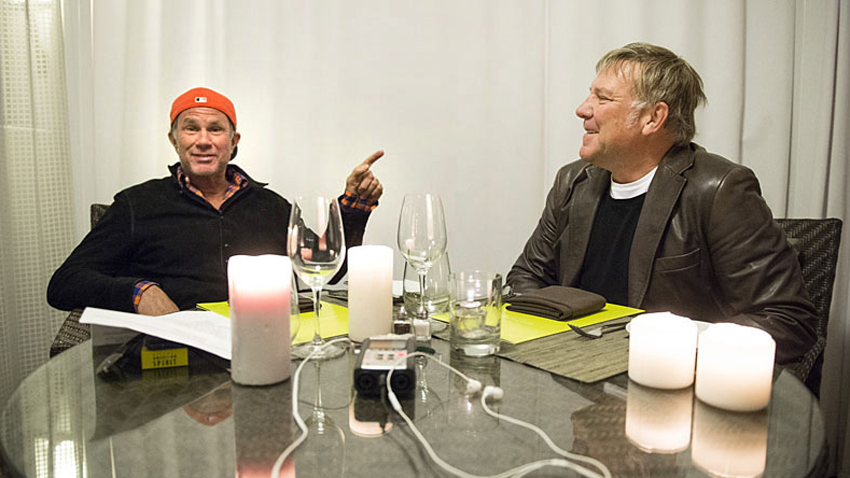
JeromeBrunet.com
Smith: You think about these guys, certainly like a Tiger Woods. He's doing very well again, obviously, but those guys, they're so good. All of them are at this level, and then he was like... how can you do that? It's amazing to me.
Lifeson: That's the exciting thing about anybody at the top of your field. It's incremental.
Smith: I think probably he has some sort of mental... from the competitive thing. A single guy, you're by yourself, like a tennis player or a golfer, but you're still competing, and there's other people around, and they know what you're doing.
Lifeson: It's really down to you.
Smith: Down to you. The subtle... you've got to make that putt. You've got to be consistent, do it over four days.
Lifeson: Yeah, and then do it again the next week.
Smith: And do it again the next week. And travel, and all this other stuff you've got to do. It's not like you go and do a gig and be like, "I fucked up, but that's OK, because I can do it tomorrow."
Lifeson: You're a team. You can make a mistake or a flub, and it passes. Nobody really notices, unless it's a terrible train wreck that you all sort of, at that moment, go through. Thankfully, those are fairly rare [laughs].
Smith: You're right. I have such respect for people at that level. It's a head game.
Lifeson: They say half of it is in your head, but I think it's more than that. Anybody can learn to turn and turn and hit a ball. To get your head out of the way of it is really difficult in golf. I think that's what's so challenging about it. It just drives people to try to get better.
Smith: That one shot, or that one hole that you play; you get lucky and have an incredible round. "I can do this. This is great."
Lifeson: There's nothing like it. That's an amazing feeling.
Smith: "I wanted to hit it there, and I did! Wow!" [Laughs]
Lifeson: "I put this little thing in that cup, 450 yards from where I…"
Smith: Have you ever got a hole in one?
Lifeson: No. Came close a couple times, but no hole in one yet.
Smith: Have you seen anybody hit a hole in one?
Lifeson: Yeah. A friend of mine, Paul McClain.
Smith: Yeah, I saw it once, one friend of mine. "Did it go in? I think it's in." It was an elevated green, I remember, and we were all like, "I don't see it."
Lifeson: This was yours?
Smith: No, not mine, another guy - my friend Russ. Maybe one of these days, we'll go and have some fun.
Lifeson: That would be great. I'd love to.
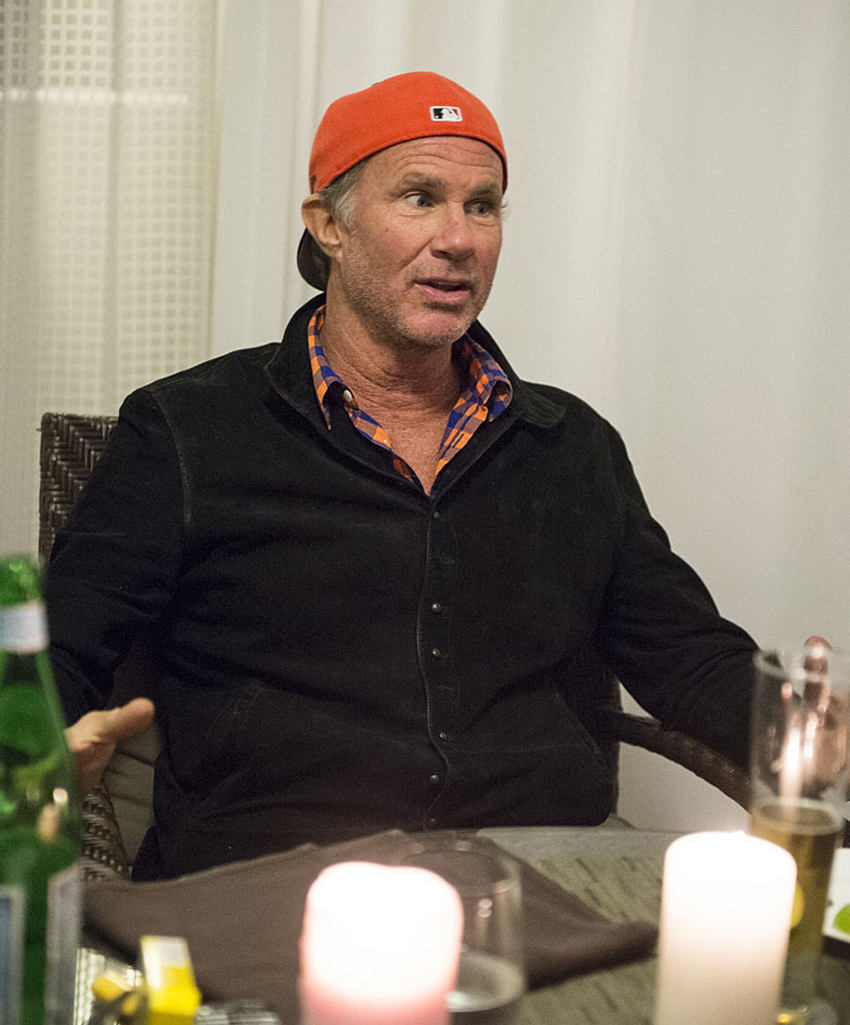
JeromeBrunet.com
Smith: Once you go on tour, you start playing. That's the thing.
Lifeson: Yeah, I play a fair bit. Less than I used to.
Smith: Who do you go with?
Lifeson: I usually go on my own. I'm really the only one. Ged doesn't play and Neil doesn't play. A few guys on the crew play. I'll go out, and I'll play with a club pro or a member - whatever. Over the years, I've developed so many contacts, and I keep track of the guys I play with. I make notes of what they were like. Often, I come back into a town, and I'll get an e-mail from them, "Hey, I hear you're in town. If you want to play, let's get out." It's nice to have that to connect with. You need to find stuff on the road. Otherwise, it so easily leads to bad habits.
Smith: Sitting in a room, watching TV.
Lifeson: That's the worst. I generally hate my hotel room; being trapped in the room with nothing to do. It's hard to just go out and do stuff. You go to a museum, or you go to an art gallery, or you go for a walk; with golf, at least you're out for four or five hours. You're with some other people.
Smith: Outdoors.
Lifeson: Every once in a while, you get a chance to walk the golf course, and that's nice. It's great therapy, for me, anyways.
Smith: It's completely... that's what I like. A couple months ago, it was like, "I forgot about everything. I don't even feel like I'm on tour right now," which is really nice.
Lifeson: It's an escape. It takes you away. It's cheaper and healthier than crack. [They laugh.] It's got something going for it.
Smith: It was good, though. It was fun. I forgot. Paul was like, "It really helps when you come, Chad, because then they really take care of us." He's like, "Usually I just go to the local thing. Are you going to play?"
Lifeson: "Then we can go to the private course."
Smith: "Then we can go to the nice clubs." [They laugh.] That's what he said. "I'm going to play this one, but if you come …"
Lifeson: "We can play that one."
Smith: The promoter knows the blah blah blah. You go, and the kids come to the concert. "We played golf tomorrow." It's kind of funny.
Lifeson: Do you know Gerry Barad from… the promoter... What's the promotion company? I went blank. They're the big promoters.
Smith: Live Nation?
Lifeson: Live Nation, yeah. Do you know, have you dealt with Gerry at all?
Smith: We probably do, but I don't know him personally. Mellow guy? Laid back? Is he a golfer?
Lifeson: He's a good golfer, and he's serious about golf, and the history of golf. He's got a photographic memory. I go out and play with Gerry, and we'll play this course, and he'll be like, "Remember two years ago we played here, and on 16 you hit that shot that just came down the right side of the fairway, and then you hit it up onto the green, and you made that put but you almost missed it and it just dropped in at the last …" I'm like, "I don't remember that." He remembers all these shots. The depth of his knowledge of the history of golf; he's really great to play with. He's connected with the most amazing clubs in America. He's set up so many great games for me.
Smith: No. That might be somebody in the future; I won't make it here on this one, but the next time I go out. Gerry Barad?
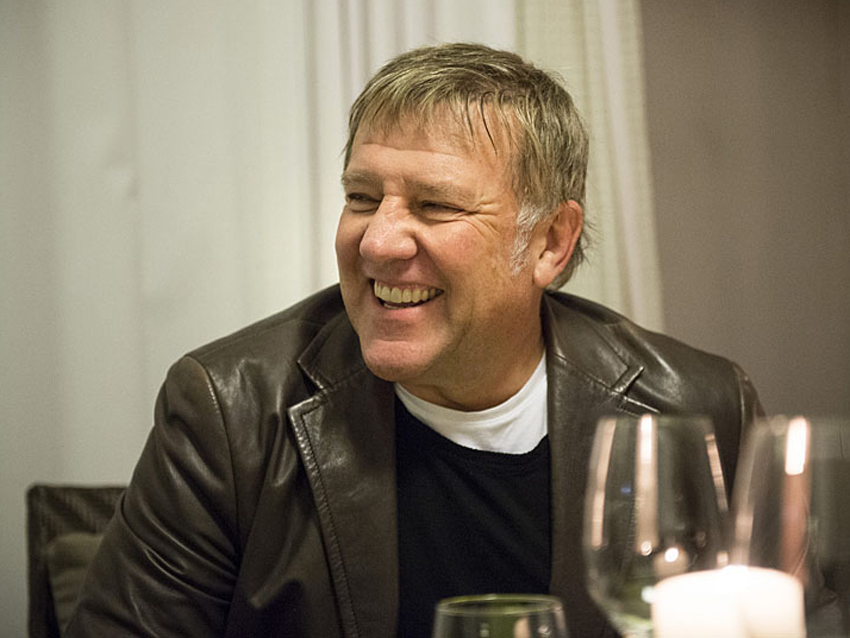
JeromeBrunet.com
Lifeson: Barad, yeah.
Smith: When you start doing it, though, it's one of those things.
Lifeson: It's addictive, for sure.
Smith: As you know. I'm like, "I don't want to get up." Then 10am rolls around, and you're doing nothing. We don't do a soundcheck. We do nothing until fucking 6:30.
Lifeson: Yes, for us 4:30, but still you've got the whole day.
Smith: I'm like, "I need my rest," and this and that and the other thing. But then I'm like, "Just get your ass out of bed." At 6:30 at home, you're getting up with the kids. Come on, man.
Lifeson: Really, you can go to the gig and you can have a little nap or something, enough to get your energy back.
Smith: You play on show days, right?
Lifeson: I used to play on every day, show days included. Less so on show days now.
Smith: I always thought, "I don't know."
Lifeson: I'm just a little sore now, physically.
Smith: Us old men - I've got a little tendinitis in the elbow. I'm like, "Maybe I don't want to aggravate that."
Lifeson: That's a good point.
Smith: You've got to do your job.
Lifeson: I have psoriatic arthritis. I've been dealing with that for about 10 years. Every year, it gets a little more difficult, and it spreads a little more. I take medication.
Smith: Is it for anti-inflammation or something?
Lifeson: I take Humera. There's another drug called Enbrel that's similar. Mickelson's on Enbrel. You inject it every two weeks. It's really super-effective, particularly for psoriatic arthritis. I don't know if I could get by without it. I still have problems, even though I've been on this for a couple years now. I just find playing now, on a show day, my body gets really sore. It's a little too much. I'll still go out; it depends.
If I'm regular with my workouts... I've hit the gym every day since we've been here, for a week now. I have my fingers crossed that I can keep it up. Even if it's for half an hour, just get on the elliptical, or on the bike, do a little bit of weight stuff. It helps so much in just keeping you a little stronger and less fatigued.
As you get older, my God, it becomes so difficult. We lose it so quickly. You just have to be disciplined about what you eat.
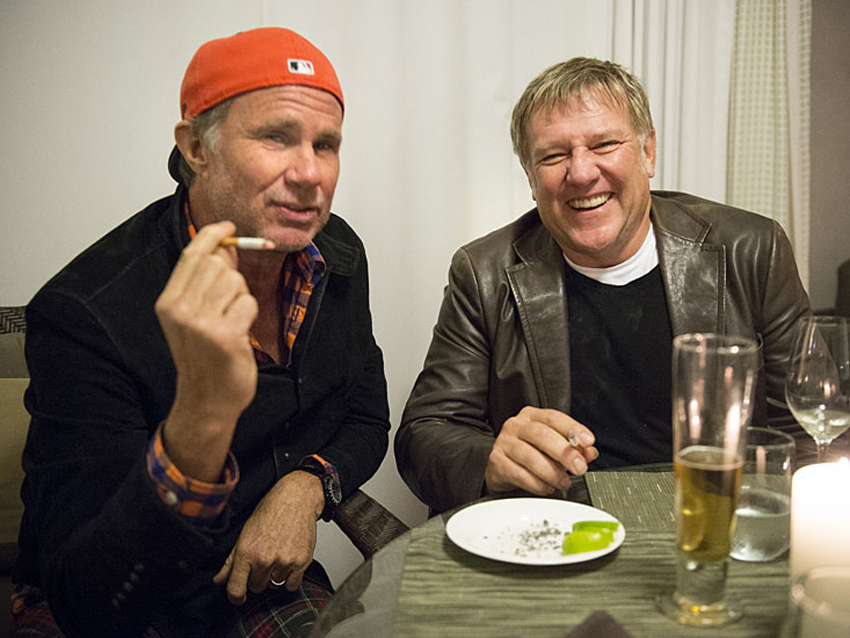
JeromeBrunet.com
Smith: That's hard.
Lifeson: When you don't feel like it.
Smith: You don't feel like it, or I'm like, "I'll be fine once I get playing." The last thing I want to be is winded, or not to be able to do what you want to do. You've got to take care of yourself. Sometimes I'm like, "Really? I really want to eat that fucking hamburger at 11 o'clock at night, and then go to bed." [They laugh.] It's not really a good idea.
Lifeson: No, yet it's such an awesome idea. [They laugh.]
Smith: With the ice cream. "I'm not 25? What? Fuck!" Here's the other thing, too, Al. We've been doing the same things we've been doing, since we were kids. We've been lucky to be able to keep doing it. I'm in this arrested development. I'm still playing music with my friends. More people are coming, and everything's great in that way. It's still what I was doing when I was a kid, but I'm not a kid anymore.
Lifeson: I know. It's a little shocking at times. "Why am I feeling this way? It's been fine for 40 years. Oh… oh, yeah, that's why."
Smith: You're rehearsing. Up until obviously …
Lifeson: Until Wednesday, and then we'll tear down, and then we do a soundcheck there.
Smith: Do you know who is playing? Heart is going to play. Public Enemy.
Lifeson: I don't know what Randy Newman's doing. I don't know if he's going to play. I'm thinking that he probably will. There's a jam, like everybody does.
Smith: Who knows? Maybe I'll jump up on the stage.
Lifeson: Yeah! You should.
Smith: Last year it was Green Day and everybody. I don't know if you saw the thing. It was really cool. I got to play with Kenney Jones, the bassist over here, and then who was the other gentleman?... It was the drummer from Green Day. He just kind of jumped up there. The other drummer from the Peppers, Jack, who was the original drummer, he was going to play. They played on Give It Away with us, but then I think Tre just kicked him off the drums [laughs]. Jack was so nice. "OK, you go ahead." I was like, "There's somebody else over there, banging along." It was fun to play with Kenney Jones; I like him. He's cool. They were all great. It's fun. L.A. should be good because there's lots of musicians. Slash and somebody else might come out. It's nice to see everybody.
Lifeson: Yes, we're kind of in the dark. There aren't a lot of definite plans [laughs], which is kind of weird, in terms of organization. We'll sort of see how it goes.
Smith: The crazy thing is, you sit there, which you'll do. You sit there all night, and it's nice. You do your speech, and then it's "Go play right now, and be fucking good." Do your three songs... Do they want you guys to do three songs?
Lifeson: Yeah, we had three. We're down to two now.
Smith: They want you to do three, one with... You do a little soundcheck, but you sit there all night and then get up and play. I'm glad we were actually on tour, and you guys are all rehearsing.
Lifeson: You're up to speed.
Smith: Still, it's like, "Go." It's a little like, "We'll do our best."
Lifeson: You know what? That's a good thing, to put you on edge a little bit.
Smith: You're on the spot: "Go." What numbers are you doing?
Lifeson: I think we're going to do... they want us to do older signature songs. We'll do Tom Sawyer and Spirit Of Radio. We were going to do YYZed, as well. It would be nice to have an instrumental song, with just playing. Because of the time constraint, we'll just do those two. There's the jam afterwards.
Smith: Are you having any kind of little party before? The night before or after?
Lifeson: Yeah. The night before, I think the Hall of Fame does a private party for the inductees only - not even wives or anybody, just the inductees. I don't know if we'll actually go to that. We'll go to soundcheck, and then we'll see. After, we've got a little thing going on. I know you're on our guest list.
Smith: Oh, good. I'll come for sure. We did a little thing at a bowling alley the night before, just for all of our friends. How many people have you got?
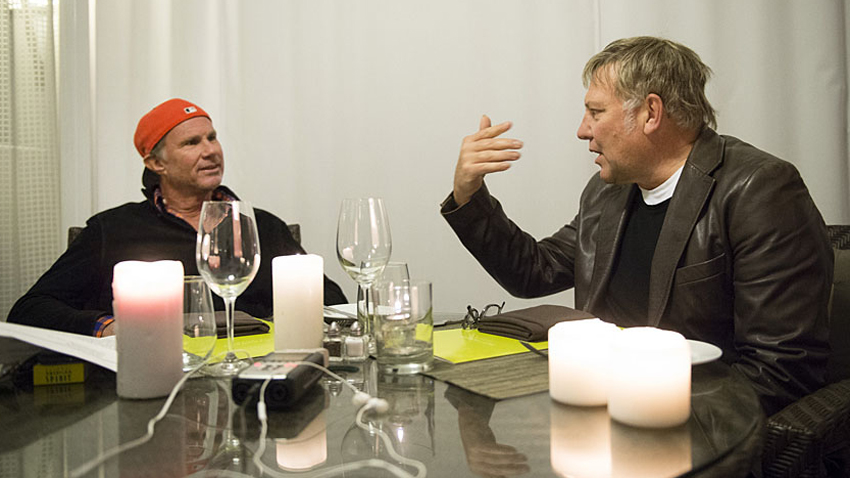
JeromeBrunet.com
Lifeson: I think we're taking 20 or 30 rooms at the London, with just family and friends, and office personnel and all of that stuff.
Smith: That's the thing. Who do you invite? You've got this table, and then the second table is da, da, da... It's like a wedding, who's going to sit with who.
Lifeson: We've got someplace booked for the party, close to the venue, close to the Nokia. I think our guest list is 120 or 130, so it's a lot of people for a party.
Smith: It's a good celebration. It'll be fun.
Lifeson: Yeah, it will be. Then the next day we leave for Austin, for the first show.
Smith: I remember when we were playing last year, you guys were on tour, right?
Lifeson: Mm-hmm.
Smith: I remember seeing, you were coming the week after us at the Charlotte blah blah blah.
Lifeson: That's right. There were a few dates that were like that. We missed each other.
Smith: I was, "Cool, they're out there doing their thing. Good." Did Nick do the last record?
Lifeson: Yeah.
Smith: So Nick's your guy now?
Lifeson: Well, for these last two records. We really enjoy working with him. He's a really, really great producer. He's a great producer for us. He's so enthusiastic.
Smith: So enthusiastic.
Lifeson: He's got such a keen sense of music and arrangement. You can't bullshit him.
Smith: He knows music.
Lifeson: He gets it. When he gives you his comments, you know that they're valid, real kind of comments. He's not just saying it.
Smith: "I feel I've got to say something." Sometimes he goes, "You know what? I love it."
Lifeson: I will say, almost every time, he's right in the point that he brings up; at least there's validity to all his criticism and comments. Some of them you don't act upon. You could go either way on them. I think the function of a really good producer is to be able to do that; to give you options and ideas, and take you to other places -
Smith: That you wouldn't have thought of.
Lifeson: You're so focused.
Smith: That's what Rick does, the same thing.
Lifeson: I'd like to work with him. I think that would be a really good experience, to work with him. My understanding is he knows when not to get too far in; he stands back, he throws some stuff out, and he leaves it up to you. I think at the level that you and we are at, that's the kind of person you want. You know what you're doing, and you know what you want to achieve. It's nice to have a spark that makes you think.
Smith: He does. He's just such a lover of music - all kinds of music - as we are. We have that in common. We've been working with him so long. He knows us so well. Often, we'll be writing our songs and getting them to a certain point where we feel like, "OK, it's time to play them." We'll talk about other guys: "Maybe this guy would work…Brian Eno… or this guy or that guy." So far, we go, "You know what? Rick's gonna be the best guy." Rick's gonna come, and he's going to give us…
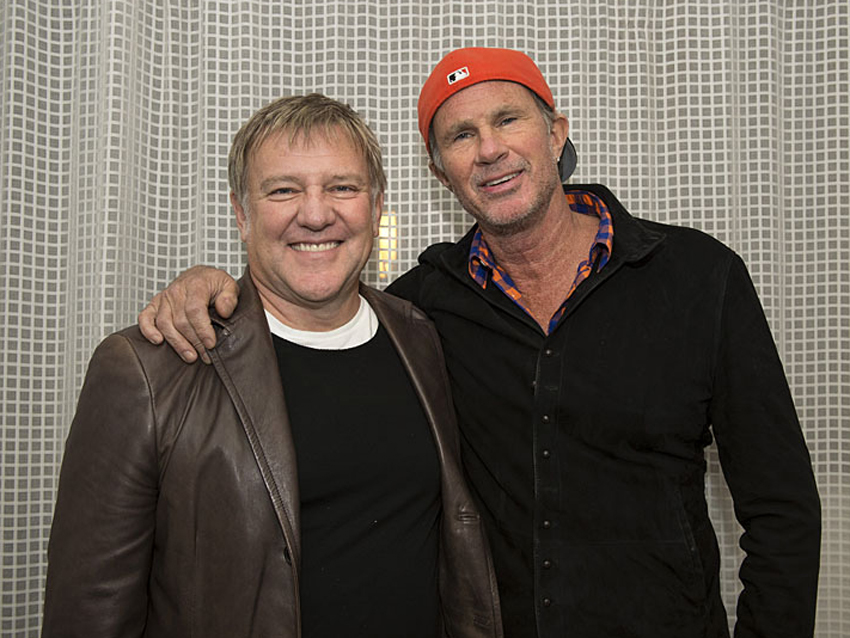
JeromeBrunet.com
Lifeson: The things you need.
Smith: Yeah. That objective… It's funny sometimes. I don't know if this happens for you, but we'll have our songs in their sort of rough... "That part goes eight times, we really don't need that." [Laughs] When you jam, with us…
Lifeson: You're into it.
Smith: You're into it. "Wait until you hear this one." We'll think it's the fucking best thing that we have. He'll be on the couch, very laid back. It's exactly right, he's not a jump-around kind of guy. He's listening. He's always listening. We'll play him this thing that we all love. We think this is the freshest, greatest thing we've done, and he'll go, "What else have you got?" [They laugh.] We'll be like, "What?! That was amazing. This is going to be the greatest thing ever!" "You've done that before. I heard that on Californication. It's good, it's good…" We're like, "Ohhhh! Are you sure? You want us to do it again? I think maybe I played it too fast." But fuck if he's not right.
Lifeson: Yeah. Then you come up with something that's better.
Smith: He's always like, "What else you got? What else you got, what else you got?" We don't like to really play stuff until there's at least two parts and a bridge, or something.
Lifeson: That's a song.
Smith: It sounds like it's more than just one thing. We'll play something that we came up with on Tuesday. "This is one thing that we did, but we don't really have anything for it." We'll play it, and he's like, "That… that's fucking good!"
Lifeson: "Start there."
Smith: "Make a song out of that." It's something we were probably going to throw away. He's worth his weight in gold. You're like, "OK," and sure enough, that will turn into something. He's very musical, and then he's really good with arrangement. He's really good at turnaround and…
Lifeson: Trimming.
Smith: We need a lot of trimming.
Lifeson: Yeah, we all do.
Smith: Or else…
Lifeson: 'Cause you're grooving on this thing - "This is awesome."
Smith: [Laughs] "This is going to come in here; it's going to make it really great."
Lifeson: He's sitting there like, "When is this part going to end?"
Smith: Yeah, he's like, "It's great, get to the chorus."
Lifeson: "This is a link to the bridge." "Really?"
Smith: "That would be a good outro... [They laugh.] You're like, "Fuck!" Not in any sort of …
Lifeson: No, in a constructive way.
Smith: Totally in a constructive way. I'm like, "Goddammit, he's fucking right." With me, he'll be in the control room; he likes to lie down actually on the couch. He's got the talk back on. We're playing our hearts out, trying to get that magical take. The worst is the long pause after the take. Instead of, "Great! It sounds great, I love it, that's great." When you really have a long pause after you finish… "Uhhh, the turnaround after the second chorus, did you always do that?"
Lifeson: "One time before when you did it, it was really good. Not now."
Smith: "Did you always do that? Did you play all that, Chad?" Or, "That's great. Chad, can you come in here?" It's like the teacher. [Laughs]
Lifeson: Yeah. "OK, come on in."
Smith: "Bring your stuff."
Lifeson: "You need a break."
Smith: "Sounds good. Chad, can you come in here? The turnaround, did you always do all that? AC/DC, maybe be simple…" I'm trying to sneak something in there. Fuck! [They laugh.] "Yeah, right, simple's great." It's good for live. He's always paying attention… and musical. I'm anxious to hear the Black Sabbath record that he just did.
Lifeson: Mmm.
Smith: That's coming out pretty soon. I wonder what that's going to be like.
Lifeson: Yeah.
Smith: He likes it. He sounds it sounds like Black Sabbath. That's all I can really get out of him.
Joe is a freelance journalist who has, over the past few decades, interviewed hundreds of guitarists for Guitar World, Guitar Player, MusicRadar and Classic Rock. He is also a former editor of Guitar World, contributing writer for Guitar Aficionado and VP of A&R for Island Records. He’s an enthusiastic guitarist, but he’s nowhere near the likes of the people he interviews. Surprisingly, his skills are more suited to the drums. If you need a drummer for your Beatles tribute band, look him up.
